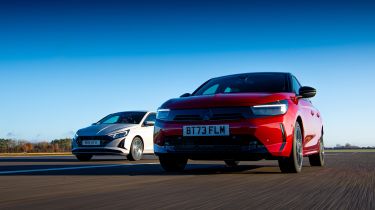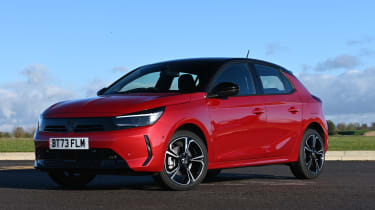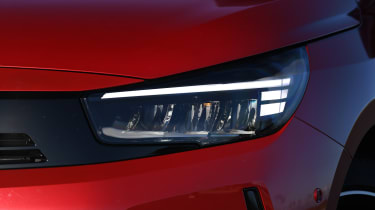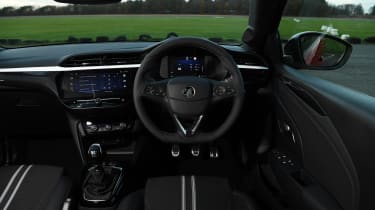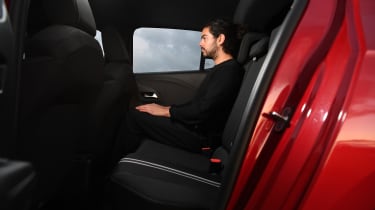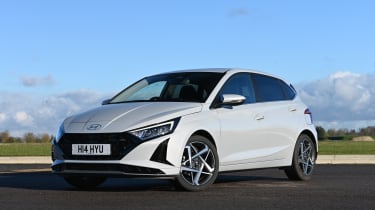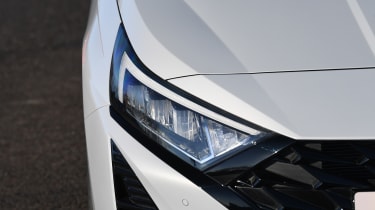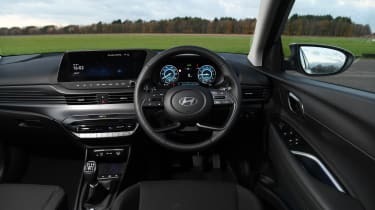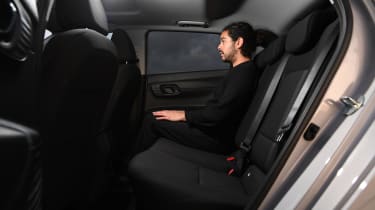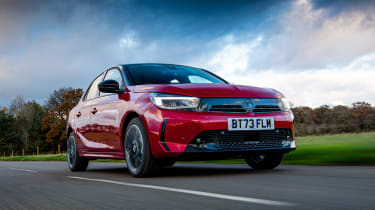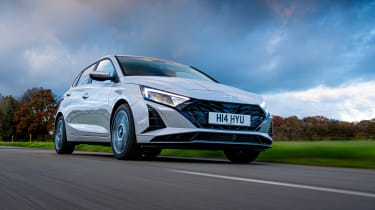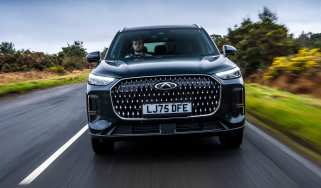Vauxhall Corsa vs Hyundai i20: supermini titans go head-to-head
Revised versions of the Vauxhall Corsa and Hyundai i20 do battle to find the best new supermini
In 2023, the supermini segment lost its most famous nameplate. After 47 years and more than 22 million units sold, production of the Ford Fiesta came to an end, leaving a large void in the class that many other manufacturers will be desperate to fill.
This golden opportunity has come at a good time for the next most established name in the class, because the Fiesta’s demise has coincided with a mid-life update for one of its closest rivals over the decades, the Vauxhall Corsa. There’s new tech, a fresh face and revised pricing, so will that all be enough for the Corsa to score an easy goal?
It won’t be if Hyundai has anything to do with it. As with the Corsa, the i20 has undergone a refresh to keep it fighting at the top of the class, and with the brand leading the way in other segments of the new car market, who’s to say it can’t achieve the same in the supermini sector, too?
| Vauxhall Corsa 1.2 Turbo GS | Hyundai i20 1.0 T-GDi Ultimate | |
| Price: | £22,905 | £24,070 |
| Powertrain: | 1.2-litre 3cyl turbo petrol, 99bhp | 1.0-litre 3cyl turbo petrol, 99bhp |
| 0-62mph: | 9.9 seconds | 10.4 seconds |
| Test efficiency: | 45.6mpg/10.0mpl | 45.0mpg/9.9mpl |
| Official CO2 | 117g/km | 125g/km |
| Annual VED: | £180 | £170 |
Vauxhall Corsa
With nearly 38,000 units registered up to the beginning of December 2023, the Corsa ranks third in the list of the UK’s best-selling cars, and is the most popular supermini by some margin. Will these updates help it to challenge the very top of the sales charts?
Tech highlights
Including the Nova – which was known as Corsa in other markets – this is the sixth generation of Vauxhall’s supermini. When the current model was released in 2019, it marked a major departure from its predecessor, after a change of ownership from General Motors to PSA (now part of the vast Stellantis group) resulted in an all-new platform.
Used - available now

2020 Jeep
Compass
50,543 milesAutomaticPetrol1.4L
Cash £12,000
2023 Tesla
Model Y Premium
24,454 milesAutomaticElectric
Cash £25,397
2024 BMW
1 Series
29,854 milesAutomaticDiesel2.0L
Cash £22,976
2021 Land Rover
Range Rover Velar
75,376 milesAutomaticPetrol2.0L
Cash £19,176From an engineering standpoint, the changes were promising; the Corsa’s structure, based on the same platform used by the Peugeot 208, Citroen C4 and others, was claimed to be 40kg lighter and 15 per cent more rigid than the outgoing car’s. The platform was designed to accept petrol, diesel and electric powertrains, and Vauxhall offered buyers the choice of all three.
Following the latest update, diesel is no more and a revised Corsa Electric delivers more power, efficiency and range. In the middle of 2024, hybrid tech will be added to the existing 1.2-litre turbo three-cylinder engines, which Vauxhall says will slash 24g/km of CO2 when compared with the existing petrol automatic model.
The manual models will continue without hybrid tech, and that’s what we’re driving here. The 1.2-litre unit produces a modest 99bhp, but a healthy 205Nm of torque that arrives at 1,750rpm.
Safety: The Corsa was awarded four stars when it was tested by Euro NCAP back in 2019. Its so-so performance in the vulnerable road users category prevented it from taking the maximum five stars.
On road
The Corsa has always had a reputation for being easy to drive, and that remains true here. Its strongest suit now, however, is its refinement.
Around town: The Corsa’s engine is torquey for such a small unit. There’s so much, in fact, that if you’re a little clumsy when pulling out of a junction, it’s quite possible to spin the front wheels.
That aside, the Corsa is very easy to drive. The manual gearbox isn’t exactly precise, but it gets the job done. Overall visibility is reasonable, while the sharp images from the reversing camera are helpful when backing into tight parking spaces.
A & B-roads: Find a twisty road, and the Corsa is capable, if not particularly fun. The main downside is the steering, which feels a little vague off-centre, and doesn’t offer much in the way of feedback. That aside, the Corsa is fairly agile through the turns, with strong grip and a neutral balance.
The 1.2-litre engine gives sprightly performance, feeling as lively as the 9.9-second 0-62mph time suggests. It’s at its best in the lower reaches of the rev range; towards the red line, the engine becomes a little more grumbly and doesn’t feel much more potent, so it’s best to ride the large wave of torque instead.
Motorway: At higher speeds, that slight bounce to the ride remains. It’s by no means unbearable, and for its size, the Corsa’s impressive refinement still makes it a decent long-distance cruiser, but it does take the shine off an otherwise solid effort.
That torquey engine comes into its own at higher speeds, because the strong pull at low revs means you don’t need to change down as frequently as in other superminis. The three-cylinder unit settles nicely at a cruise, and can top 50mpg quite easily.
Ownership
The Corsa’s overall cabin design is much the same as before, with changes limited to some new trim materials and a reprofiled steering wheel boss that apes the ‘Vizor’ grille on the nose. If you go for an automatic model, the old drive selector has been replaced by a smaller, neater rocker switch.
The largely hard, scratchy plastic is punctuated by the occasional bit of soft leather-like material on the door panels and sparkly inserts on the dashboard; it doesn’t have the wow-factor of some rival superminis, but it feels solid enough and the design is functional. The climate-control system uses three knobs to control temperature and fan speed, flanked by buttons for the heated rear window and air-direction settings. There are fewer shortcut keys below the new 10-inch touchscreen, but the simple headlight controls remain.
The seats are trimmed in new upholstery and they feel comfortable, even on long journeys, helped in no small part by a generous range of adjustment. Every Corsa is now fully digital inside, with analogue clocks ditched in favour of a seven-inch screen. It’s pretty underwhelming, though; the rev counter comprises narrow columns on either side of the screen, which isn’t as easy to read as the old analogue layout.
Vauxhall finished in 24th place out of 32 makers in our 2023 Driver Power satisfaction survey. Owners liked their cars’ ride comfort, economy and low running costs, while the infotainment upgrades will be welcome, because that was a previous weak point. Hyundai fared a little better, taking 17th, with 21 per cent of owners experiencing faults, compared with 23 per cent of Vauxhall drivers.
Storage: Corsa occupants benefit from three cup-holders inside, but the charging cubby for smartphones isn’t quite large enough for the latest devices. The glovebox is tiny, but the door bins are fairly deep, both front and rear.
Practicality
The Corsa is similar in size to its rivals, but inferior packaging means it falls short of the class leaders for interior space.
Rear space: Adults won’t be as comfortable in the Corsa as they would be in the Hyundai i20 or even roomier rivals such as the Renault Clio or Skoda Fabia.
Kneeroom is below the class standard, and headroom is a significant margin behind the Hyundai’s. The Vauxhall is also narrower across the cabin, so it’s tighter with three on board. The Isofix mounts are hidden behind zipped covers, which are fiddly to reach when installing a child seat.
Boot: At 309 litres, the Corsa’s boot has a narrow edge over its rival. However, while the load lip height is a couple of millimetres lower than the i20’s, there’s a fairly deep rear bumper to lift items over. The 60:40-split seats don’t fold flat and leave a step in the load area when they’re dropped.
What to buy?
Which engine and trim we’d choose
- Powertrain: There are three engine options; there’s a 74bhp 1.2 petrol, the 99bhp 1.2 turbo driven here costs £900 extra, while the 128bhp version is auto-only and carries a £2,700 premium.
- Trim: There are three levels: Design, GS and Ultimate. All models get LED headlights, traffic-sign recognition, cruise control, electric windows and rear parking sensors. The GS adds LED tail-lights, front parking sensors, climate control, built-in nav and a rear camera and more. The Ultimate gets a heated wheel and seats, adaptive cruise, wireless phone charging and more driver-assist tech.
- Our choice: GS trim paired with the 99bhp engine (as in this car) is a good compromise.
Hyundai i20
The i20 we have here is in top-spec Ultimate trim, so it’s a closer match to the Corsa Ultimate than the GS we’ve lined it up against. The i20 Premium matches the Vauxhall, but both are more expensive to buy whether outright or on finance.
Tech highlights
Updates to the i20 range aren’t quite as extensive as the Corsa’s facelift, with the main focus on minor cosmetic tweaks, improved in-car tech and more generous standard kit. Even those changes are minor, though, including jobs such as replacing the USB ports with newer USB-C connections.
The range has been simplified, too, with just the 99bhp 1.0-litre turbocharged petrol engine offered – the previous 118bhp option has been dropped. That 99bhp figure is a match for the Corsa’s, while the peak is reached sooner, too, arriving at 4,500rpm, which is 1,000rpm earlier than in the Vauxhall. However, the Corsa’s 205Nm trumps the i20’s 172Nm. The Hyundai’s engine can be paired with either the six-speed manual gearbox we’re driving here, or a seven-speed automatic.
Safety: A four-star rating for the i20 matches that awarded to the Corsa, but the scores aren’t directly comparable, because the Hyundai was tested in 2021, and therefore subjected to a more robust assessment than the Corsa was two years earlier.
The updated i20 features additional safety tech when compared with the car that Euro NCAP scored; an improved forward-collision warning and avoidance system is now standard across the range, and unlike previous set-ups, is able to recognise cyclists. A smart cruise control system, available as an £800 option on the Ultimate when paired with an automatic gearbox, can stop and start the car in heavy traffic, and adjust its speed based on upcoming corners where necessary.
On road
The Hyundai is a decent supermini to drive, with its chassis running the Corsa very close in some areas and even exceeding it in others. However, its the engine and transmission that let it down.
Around town: The first time you change gear in the i20 will make you feel like a learner all over again. Shift from first to second, and the power cuts so strongly – and takes so long to re-engage – that all forward progress is lost. No matter how much or little clutch slip we tried, we never managed a smooth shift between the two ratios.
Every other gear was fine – even if the shift is light and wooly – which made this all the more frustrating, especially as the i20 is very easy to drive around town otherwise.
A & B-roads: Ask for more performance, and once again it’s the powertrain that gets in the way. Those higher ratios are smoother, but the gearbox can’t be rushed, because the power takes so long to follow. In a car that takes 10.4 seconds to get from 0-62mph, it’s worth bearing in mind when joining a slip road or performing an overtake with any urgency. The Corsa’s on-paper stats are similar, but it’s significantly more flexible in the real world.
The Hyundai’s ride is a little firmer than the Vauxhall’s, but it also feels better controlled. Whether at low or high speeds, there’s a little less fidget transmitted through to the cabin, and on a twisty road there’s less lean through the corners.
Motorway: The i20 feels more controlled and planted than the Corsa at higher speeds, but there isn’t much to separate the pair. Given that the Corsa’s engine is more flexible – even at motorway speeds – it’d get the nod over the i20 if we had to cover a long journey in one of them.
Ownership
The i20’s mid-life refresh didn’t alter the interior design very much, with a boost in tech being the most notable improvement. All trim levels now come with a 10.25-inch digital instrument panel as standard. It’s a larger and brighter display than the Corsa’s, and its information is presented more clearly – as long as you don’t choose the quirky cube-based screen layout, which looks rather fussy. Interior lighting is now by brighter LEDs instead of the previous incandescent bulbs, and 64-colour ambient lighting allows owners to personalise the shade to their own taste.
However, the main downside of the i20’s cabin remains, and that’s the material feel. The dashboard is covered in a range of plastics – some smooth and some with a ridged effect – but they all feel very hard and cheap. It’s a shame, because the overall build quality is fine, and the buttons work solidly enough. That includes the physical controls for the air-conditioning – the big rocker switches that adjust the temperature are easy to nudge up and down without needing to take your eyes away from the road.
All Hyundais come with a five-year warranty as standard – beating Vauxhall’s cover by two years – and there’s an unlimited mileage cap, compared with a 60,000-mile limit for the Corsa. Roadside assistance isn’t as generous, with 12 months of cover, compared with Vauxhall’s three-year plan.
Storage: While a centre armrest-cum-storage bin is optional in the Corsa, it’s standard in the i20; it adds a little extra comfort on long trips, and there’s also enough space beneath the closed lid to hold a wallet, keys and a couple of other trinkets.
The generous front door bins grow wider at their leading edge to accommodate a 1.5-litre bottle, and the back-door bins can hold slightly smaller bottles. The glovebox is larger than the Corsa’s, but the front cup-holders are fairly shallow.
Practicality
The i20 isn’t quite a class leader for passenger space, but it’s above average for the segment and roomier than the Corsa.
Rear space: Headroom is impressive in the back of the i20, exceeding that of not only the Corsa, but also the Renault Clio, and it runs the class-best Skoda Fabia close.
The wide, soft rear bench means travelling three-up is less of a hardship than in the Vauxhall, while foot space under the front seats is fine. Unlike in its rival here, there’s a USB-C port in the back, so passengers can charge their devices.
Boot: While passenger space is good, the boot is only average. At 304 litres, it’s five litres smaller than the Vauxhall’s load bay, but is well thought out. Under-floor storage is generous, and a pocket to the side has Velcro straps to secure smaller items. Fold the rear seats, and the 1,205-litre total is 87 litres more than the Corsa’s.
What to buy
Which engine and trim we’d choose
- Engines: The revised i20 now only comes with the three-cylinder turbo petrol tested here. A six-speed manual gearbox is standard, or there’s a seven-speed dual-clutch auto for £1,250 extra.
- Trim: There are three levels available. Advance cars have 16-inch alloys, LED headlights, rear parking sensors, manual air con and an eight-inch touchscreen. Premium trim adds larger wheels, heated seats, front parking sensors, the larger display and more for £1,800 extra. The Ultimate costs another £1,500 and gets niceties such as a sunroof, keyless entry and wireless phone charging.
- Our choice: The mid-range Premium with a manual gearbox is the one we’d pick.
Results
Which car comes out on top?
Winner: Vauxhall Corsa
The Corsa’s appeal has been boosted by these mid-life updates. The main improvement that most buyers will notice is the uprated in-car tech, but the benefits will also be felt in the wallet, should you take a finance deal.
While the Corsa still doesn’t quite have the all-round qualities of the class-leaders, it’s solid to drive, fairly cheap to run and looks sharper than ever thanks to that new face. We can’t see this sales success faltering any time soon.
| Pros | Cons |
| Lively engine | Vague steering |
| Slick infotainment | Rear-seat space |
| Low running costs | Ride never quite settles |
| Refinement | Rivals are better equipped |
Runner up: Hyundai i20
Previously, we would have picked the i20 over the Corsa, and if you value rear-seat space and standard kit, that would still be the case. However, while the Corsa has improved with its mid-life update, it feels like the Hyundai has largely stood still, except for its prices, which can’t compete with either the Corsa or the class leaders.
Throw in an engine and gearbox combination that lags behind its rival here, and it doesn’t have enough to take this contest.
| Pros | Cons |
| Standard equipment | Sloppy manual gearbox |
| Firm yet controlled ride | Cheap interior plastics |
| Roomy cabin | Limited engine choice |
| Precise steering | High finance costs |
Rivals and other options
The Corsa wins our twin test but what else is out there?
- Same class: Renault Clio
- Same money: Skoda Fabia
- Used (same price): Audi Q2
- Electric option: Vauxhall Corsa-E
- Coming soon: Citroen e-C3
The great debate
What the Auto Express test team would do…
Jordan Katsianis, senior staff writer: “While Vauxhall has the supermini sales charts buttoned up following the Fiesta’s demise, Ford has left a gap in the performance market for Hyundai to exploit. The i20 N is one of the best hot hatches ever made – we just hope that Hyundai chooses to facelift the racy supermini along with the rest of the range.”
Richard Ingram, deputy editor: “The Corsa Electric has been boosted as part of the updates. Its 54kWh battery is 4kWh larger than the old car’s, and it’s 35kg lighter, too, while power jumps from 134bhp to 154bhp. It’s more efficient than before, so the claimed 248-mile range should be achievable in real-world driving.”
Dawn Grant, picture editor: “If you’re willing to splash a little cash in the name of style, then the Peugeot 208 is worth a look. It’s almost identical to the Corsa under the skin, and the French brand has wrapped up those mechanicals in a more stylish, and more expensive- feeling package. An updated version has just been released, too.”
Steve Fowler, editor-in-chief: “It’s good to see Vauxhall still improving its supermini challenger. Making small cars profitable is tricky – just ask Ford – but investing in improved electrified tech and all-new hybrid powertrains shows that the brand, plus parent Stellantis, is still working hard on delivering pragmatic small vehicles.”
Dean Gibson, senior test editor: “If it was my cash, I’d still find it very hard to look beyond a Dacia Sandero. Our best supermini of 2023 is based upon the Clio, and although it does away with any unnecessary tech or design flourishes – which results in an exceptionally cheap supermini – it still gets the job done.”
Which would you buy? Let us know in the comments section below…
| Vauxhall Corsa 1.2 Turbo GS | Hyundai i20 1.0 T-GDi Ultimate | |
| On the road price/total as tested | £22,905/£23,605 | £24,070/£24,635 |
| Residual value (after 3yrs/36,000) | £10,216 | £11,867 |
| Depreciation | 44.60% | 49.30% |
| Annual fuel. cost (10k/20k miles) | £1494/£2998 | £1514/£3028 |
| Ins. quote/VED | £1009/£180 | £852/ £170 |
| Service costs (3 years) | £685 | £584 |
| Length/wheelbase | 4,060/2,538mm | 4,065/2,580mm |
| Height/width | 1,433/1,765mm | 1,450/1,775mm |
| Powertrain | 1.2-litre 3cyl turbo petrol, 99bhp | 1.0-litre 3cyl turbo petrol, 99bhp |
| Peak power | 99bhp/5,500rpm | 99bhp/4,500rpm |
| Peak torque | 205Nm/1,750rpm | 172Nm/1,500rpm |
| Transmission | Six-speed manual/fwd | Six-speed manual/fwd |
| Fuel tank (litres) | 44 litres | 40 litres |
| Boot capacity (seats up / down) | 309/1,118 litres | 304/1,205 litres |
| Kerbweight / power-to-weight | 1,234/515/1,200kg | 1,175/425/1,110kg |
| Turning circle | 10.4 metres | 10.4 metres |
| Basic warranty/recovery | 3yrs (60,000)/3yrs | 5yrs (unlimited)/1yr |
| Driver Power manufacturer position | 24th | 17th |
| Euro NCAP: Adult / child / ped. / assist / stars | 84/86/66/69/4 (2019) | 76/82/76/67/4 (2021) |
| 0-62mph / top speed | 9.9 seconds/120mph | 10.4 seconds/117mph |
| Test economy / range | 45.6mpg/441 miles | 45.0mpg/396 miles |
| WLTP combined (MPG) | 54.3mpg/11.9mpl | 51.3mpg/11.3mpl |
| Actual/claimed CO2/tax bracket | 143/117g/km/28% | 145/125g/km/30% |
| Number of airbags / Isofix points | Six/three | Six/two |
| Parking sensors/camera | Front & rear/yes | Front & rear/yes |
| Lane-keep assist / blindspot / AEB | Yes/yes/yes | Yes/yes/yes |
| Climate control/adaptive cruise ctrl | Yes/yes | Two-zone/yes |
| Leather / heated seats / wheel | No/£500 pack/£500 pack | No/yes/yes |
| Metallic paint/LED lights | £700/yes | £565/yes |
| Keyless entry & go/powered tailgate | Yes/no | Yes/no |
| Sat-nav/digital dashboard/USBs | Yes/yes/one | Yes/yes/three |
| Online services/wireless charging | Yes/no | Yes/yes |
| Apple CarPlay/Android Auto | Yes/yes | Wireless/yes |

